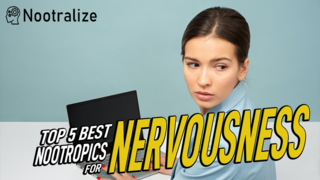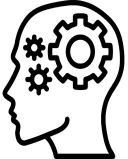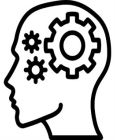Nootropics
5 Science-Backed Nootropics for Nervousness Reduction
Based on placebo-controlled studies, here are five supplements for nervousness.
Posted August 6, 2020

A nootropic is a substance that, if used properly, safely enhances the cognitive functions of the user.
As public interest in cognitive enhancers escalates, the demand for high-quality evidence on the safety and efficacy of nootropics seems to outgrow the supply of that information. Although new placebo-controlled studies are published frequently, they can be hard to read and misrepresentative of the entire body of knowledge the scientific community has provided on the effects of nootropics. These are some of the reasons why we systematically went through 527 placebo-controlled studies [1] on the effects of 127 nootropics and put together a list with the five most science-backed ones for improving nervousness. If a nootropic was not included in this list, it doesn’t necessarily mean it’s ineffective for reducing nervousness. It likely means there is less research on the effects of that compound in healthy humans than there’s for each nootropic that made it on to the list.
Out of the 527 studies, 38 included measures of nervousness. A total of 2,420 participants had their nervousness tested, and 12 nootropics were assessed for safety and efficacy for improving levels of nervousness. Based on this body of evidence, these are the five most science-backed nootropics for reducing nervousness in healthy humans.
Turmeric
In the three studies we reviewed that examined the effects of Turmeric on measures of nervousness, 224 participants were included. [3-5]
Overall, these studies found a small positive effect on nervousness from the use of Turmeric.
The evidence we reviewed also suggests that Turmeric can improve:
- Mood (minute effect)
- Memory (small effect)
- Physical performance (small effect)
- Focus (minute effect)
- Energy (small effect)
- Sociality (small effect)
- Learning (moderate effect)
- Mindfulness (small effect)
- Sleep (minute effect)
Risks
Side effects
Less than 60% experience:
- Gastrointestinal complaints
Less than 10% experience:
- Common cold symptoms
- Diarrhea
- Abdominal pain
- Headache
- Nausea
- Stomach discomfort
- Gastrointestinal muscle cramp
- Conjunctivitis (pink eyes due to inflammation)
Legality
Turmeric is legal to buy, possess, and use in the United States, United Kingdom, Sweden, Canada, and Australia. [6-25]
Conclusion
Preliminary evidence suggests Turmeric has a small positive impact on nervousness. Moreover, Turmeric is generally safe and legal.
How to Use
It is probably safer and more effective to use nootropics as they have been used in studies on humans. In the studies we’ve reviewed, Turmeric was used in the following ways:
- 2000 mg dosages daily for 12 weeks [2]
- 150 mg doses for acute effects [3]
- 900 mg doses for acute effects [3]
- 400 mg dosages daily for 8 weeks [4]
- 1500 mg dosages daily for 1 year, 1 day and 6 hours [5]
Ashwagandha
In the three studies we reviewed which examined the effects of Ashwagandha on measures of nervousness, 167 participants were included. [26][28][29]
Overall, these studies found a small positive effect on nervousness from the use of Ashwagandha.
The evidence we reviewed also suggests that Ashwagandha can improve:
- Mood (small effect)
- Memory (minute effect)
- Physical performance (small effect)
- Focus (small effect)
- Energy (small effect)
- Sociality (small effect)
- Stress (moderate effect)
- Mindfulness (small effect)
- Sleep (large effect)
Risks
Side effects
Less than 10% experience:
- Joint pain
- Abdominal pain
- Muscle pain
Legality
Ashwagandha is legal to buy, possess, and use in United States, United Kingdom, Sweden, Canada, and Australia. [7-12][14][15][17-19][20][22][23][25][32-36]
Conclusion
Preliminary evidence suggests Ashwagandha has a small positive impact on nervousness. Moreover, Ashwagandha is generally safe and legal.
How to Use
It is probably safer and more effective to use nootropics as they have been used in studies on humans. In the studies we’ve reviewed, Ashwagandha was used in the following ways:
- 600 mg dosages daily for 12 weeks [26]
- 1000 mg dosages daily for 2 weeks [27]
- 240 mg dosages daily for 8 weeks and 4 days [28]
- 250 mg dosages daily for 8 weeks [29]
- 600 mg dosages daily for 8 weeks [29]
- 500 mg dosages daily for 12 weeks [30]
- 600 mg dosages daily for 8 weeks [31]
Panax Ginseng
In the 2 studies we reviewed which examined the effects of Panax Ginseng on measures of nervousness, 70 participants were included. [41][42]
Overall, these studies found a small positive effect on nervousness from use of Panax Ginseng.
The evidence we reviewed also suggests that Panax Ginseng can improve:
- Mood (small effect)
- Focus (minute effect)
- Energy (minute effect)
- Sociality (small effect)
- Stress (small effect)
- Intelligence (minute effect)
- Mindfulness (small effect)
Risks
Side effects
No negative side effects were seen in any of the studies we reviewed.
Legality
Panax Ginseng is legal to buy, possess, and use in the United States and Canada. [7-9][17–20][43][44]
Conclusion
Preliminary evidence suggests Panax Ginseng has a small positive impact on nervousness. Moreover, Panax Ginseng is generally safe and legal.
How to Use
It is probably safer and more effective to use nootropics as they have been used in studies on humans. In the studies we’ve reviewed, Panax Ginseng was used in the following ways:
- 4500 mg non-extract powder dosages daily for 2 weeks [37]
- 200 mg extract doses for acute effects [38]
- 200 mg extract doses for acute effects [39]
- 200 mg extract doses for acute effects [40]
- 400 mg extract doses for acute effects [40]
- 200 mg extract dosages daily for 1 week [41]
- 400 mg extract dosages daily for 1 week [41]
- 400 mg extract doses for acute effects [42]
Sage
In the two studies we reviewed which examined the effects of Sage on measures of nervousness, 66 participants were included. [45][47]
Overall, these studies found a small positive effect on nervousness from the use of Sage.
The evidence we reviewed also suggests that Sage can improve:
- Mood (minute effect)
- Memory (minute effect)
- Focus (minute effect)
- Energy (minute effect)
- Sociality (small effect)
- Stress (minute effect)
- Intelligence (minute effect)
- Learning (small effect)
- Mindfulness (minute effect)
Risks
Side effects
No negative side effects were seen in any of the studies we reviewed.
Legality
Sage is legal to buy, possess, and use in the United States and Canada. [7-9][17-20][49][50]
Conclusion
Preliminary evidence suggests Sage has a small positive impact on nervousness. Moreover, Sage is generally safe and legal.
How to Use
It is probably safer and more effective to use nootropics as they have been used in studies on humans. In the studies we’ve reviewed, Sage was used in the following ways:
- 300 mg extract powder doses for acute effects [45]
- 600 mg extract powder doses for acute effects [45]
- 50 µl essential oil doses for acute effects [46]
- 100 µl essential oil doses for acute effects [46]
- 150 µl essential oil doses for acute effects [46]
- 25 µl essential oil doses for acute effects [46]
- 50 µl essential oil doses for acute effects [46]
- 50 mg extract powder doses for acute effects [47]
- 167 mg extract powder doses for acute effects [48]
- 333 mg extract powder doses for acute effects [48]
- 666 mg extract powder doses for acute effects [48]
- 1332 mg extract powder doses for acute effects [48]
Lemon Balm
In the two studies we reviewed which examined the effects of Lemon Balm on measures of nervousness, 38 participants were included. [51][52]
Overall, these studies found a small positive effect on nervousness from the use of Lemon Balm.
The evidence we reviewed also suggests that Lemon Balm can improve:
- Mood (minute effect)
- Sociality (small effect)
- Stress (minute effect)
- Intelligence (minute effect)
- Mindfulness (minute effect)
Risks
Side effects
No negative side effects were seen in any of the studies we reviewed.
Legality
Lemon Balm is legal to buy, possess, and use in United States, United Kingdom, Sweden, Canada and Australia. [7-9][11][12][14][17-20][22][23][25][54–60]
Conclusion
Preliminary evidence suggests Lemon Balm has a small positive impact on nervousness. Moreover, Lemon Balm is generally safe and legal.
How to Use
It is probably safer and more effective to use nootropics as they have been used in studies on humans. In the studies we’ve reviewed, Lemon Balm was used in the following ways:
- 600 mg doses for acute effects [51]
- 1000 mg doses for acute effects [51]
- 1600 mg doses for acute effects [51]
- 600 mg doses for acute effects [52]
- 600 mg doses for acute effects [52]
- 900 mg doses for acute effects [53]
- 600 mg doses for acute effects [53]
- 300 mg doses for acute effects [53]
If you have the right mindset to nootropic use (awareness of risks and how to avoid them), you’re in a great position to benefit from cognitive enhancers.
There’s a need for more research on each of the nootropics in this list. Specifically, there’s a great degree of individual variance in how people respond to nootropics. This means that if you use a nootropic that there was a small effect from in a study with dozens of participants, you may get no effect or a large effect. Currently, while we wait for science to elucidate who is likely to respond to which nootropics, patient self-experimentation is the best method for nootropic use success.
To understand the effects a nootropic has on you, it is important to continuously test your cognitive performance both subjectively and objectively. To do this efficiently, you may try the Nootralize web app.
This post was originally published at blog.nootralize.com. It is not a substitute for professional medical advice, diagnosis, or treatment.
References
[1] https://nootralize.com/how-nootralize-researches-nootropics/
[2] https://www.ncbi.nlm.nih.gov/pmc/articles/PMC6004902/
[3] https://www.ncbi.nlm.nih.gov/pmc/articles/PMC5897237/
[4] https://pubmed.ncbi.nlm.nih.gov/32512782/
[5] https://www.cambridge.org/core/journals/british-journal-of-nutrition/ar…
[6] https://dsld.nlm.nih.gov/dsld/prdLabel.jsp?id=180630
[7] https://www.tsa.gov/travel/security-screening/whatcanibring/items/suppl…
[8] https://www.faa.gov/hazmat/packsafe/
[9] https://www.fda.gov/industry/import-basics/personal-importation
[10] https://www.gov.uk/government/publications/list-of-banned-or-restricted…
[11] https://www.gov.uk/hand-luggage-restrictions/essential-medicines-and-me…
[12] https://assets.publishing.service.gov.uk/government/uploads/system/uplo…
[13] https://www.lakemedelsverket.se/sv/behandling-och-forskrivning/kopa-anv…
[14] https://www.transportstyrelsen.se/sv/luftfart/Flygresenar/Bagage/Vad-fa…
[15] https://www.tullverket.se/sv/privat/handlapanatet/kosttillskottpanatet…
[16] http://webprod.hc-sc.gc.ca/nhpid-bdipsn/ingredReq.do?id=6059&lang=eng
[17] https://www.catsa-acsta.gc.ca/en/medication-and-medical-items
[18] https://www.canada.ca/en/health-canada/services/drugs-health-products/n…
[19] https://www.canada.ca/en/health-canada/services/drugs-health-products/n…
[20] https://www.canada.ca/en/health-canada/services/drugs-health-products/c…
[21] https://www.odc.gov.au/ws-lps-index?search_api_views_fulltext=turmeric&…
[22] https://www.abf.gov.au/entering-and-leaving-australia/can-you-bring-it-…
[23] https://www.abf.gov.au/entering-and-leaving-australia/can-you-bring-it-…
[24] https://www.ebs.tga.gov.au/ebs/PublicHTML/pdfstore.nsf/TemplateEngineIn…
[25] https://www.tga.gov.au/personal-importation-scheme
[26] https://www.ncbi.nlm.nih.gov/pmc/articles/PMC4687242/
[27] https://www.ncbi.nlm.nih.gov/pmc/articles/PMC3897003/
[28] https://www.ncbi.nlm.nih.gov/pmc/articles/PMC6750292/
[29] https://www.ncbi.nlm.nih.gov/pmc/articles/PMC6979308/
[30] https://www.ncbi.nlm.nih.gov/pmc/articles/PMC6266766/
[31] https://www.ncbi.nlm.nih.gov/pmc/articles/PMC4658772/
[32] https://dsld.nlm.nih.gov/dsld/prdLabel.jsp?id=44575
[33] https://www.lifebutiken.se/produkter/ksm-66-120-kapslar
[34] http://webprod.hc-sc.gc.ca/nhpid-bdipsn/ingredReq.do?id=6569&lang=eng
[35] https://www.odc.gov.au/ws-lps-index?search_api_views_fulltext=ashwagand…
[36] https://www.ebs.tga.gov.au/ebs/PublicHTML/pdfstore.nsf/TemplateEngineIn…
[37] https://www.ncbi.nlm.nih.gov/pmc/articles/PMC3659585/
[38] https://pubmed.ncbi.nlm.nih.gov/16401645/
[39] https://www.essentialnutrition.com.br/media/artigos/quantum/22.%20Impro…
[40] https://pubmed.ncbi.nlm.nih.gov/15982990/
[41] https://pubmed.ncbi.nlm.nih.gov/20737519/
[42] https://www.academia.edu/924620/Modulation_of_cognition_and_mood_follow…
[43] https://dsld.nlm.nih.gov/dsld/prdLabel.jsp?id=42816
[44] http://webprod.hc-sc.gc.ca/nhpid-bdipsn/ingredReq.do?id=6326&lang=eng
[45] https://www.nature.com/articles/1300907
[46] http://citeseerx.ist.psu.edu/viewdoc/download?doi=10.1.1.921.6614&rep=r…
[47] https://pubmed.ncbi.nlm.nih.gov/20937617/
[48] https://www.researchgate.net/publication/5502737_An_extract_of_Salvia_s…
[49] https://dsld.nlm.nih.gov/dsld/prdLabel.jsp?id=79901
[50] http://webprod.hc-sc.gc.ca/nhpid-bdipsn/ingredReq.do?id=14125&lang=eng
[51] https://www.nature.com/articles/1300230
[52] https://www.deepdyve.com/lp/wolters-kluwer-health/attenuation-of-labora…
[53] http://accurateclinic.com/wp-content/uploads/2016/11/Modulation-of-mood…
[54] https://dsld.nlm.nih.gov/dsld/prdLabel.jsp?id=80077
[55] http://www.legislation.gov.uk/uksi/2003/1387/schedule/2/made
[56] https://www.lakemedelsverket.se/sv/sok-lakemedelsfakta?prodClass=3&acti…
[57] https://www.tullverket.se/sv/privat/handlapanatet/handlalakemedelpanate…
[58] http://webprod.hc-sc.gc.ca/nhpid-bdipsn/ingredReq.do?id=6281&lang=eng
[59] https://www.odc.gov.au/ws-lps-index?search_api_views_fulltext=lemon-bal…
[60] https://www.ebs.tga.gov.au/ebs/PublicHTML/pdfstore.nsf/TemplateEngineIn…




